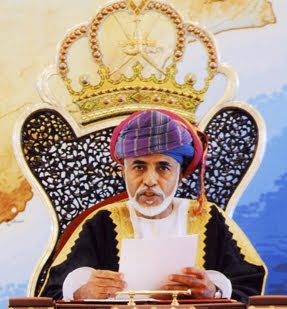(1) I'm depressed because my favorite English bloggers have all left. Muscat Confidential, Muscat Jet Driver, Other Oman, Reality in Oman, Sleepless in Salalah, etc. Why?! At least Andy , Sultanate Social , Muscat Mutterings and Angry in Oman are still around. Yes, it's official, Angry in Oman is back :)
.
(2) Monsoon in Dhofar is officially gone. If you drive deep enough into the mountains you may spot a few tufts of lush green here and there, but rest assured they won't be there for long. I'd give it a couple of days before the camels find them. However, that doesn't mean tourist season is over! October marks the beginning of Salalah's more 'Western' tourist season. From October-February we get thousands of tourists from Europe who arrive by plane (direct from Sweden/Germany,etc) or on cruise ships. Yesterday I was in Al Haffa Souk buying bukhoor/frankincense (a task my mother has been nagging me about for the past week) when I was shoved to the side by what looked like a bulldog in a tank top wanting to get a look at the bukhoor display. An elderly German woman with very very very short hair, lots of rolls (as in stomach rolls) and a tiny tank top. Why on earth would you wear something like that when you're so overweight? She was loud, rude, smoking, and very inappropriately dressed. Just the kind of tourist I HATE seeing in Salalah.
.
(3) Don't get me wrong, I love Oman and I love the Sultan, but something has been bothering me lately. National Day preparations. If you haven't already noticed, most schools in Salalah start the school day at 7 a.m and end at 11 a.m. Yes, eleven. For the ENTIRE semester. Why? Because they're busy in the afternoons practicing their dance routines for the 40th national day dance/event/operetta (?) which evidently they're being paid to do. Wtf? The 'event' is scheduled to be held in Salalah on November 28th or 29th. Furthermore, each kid participating will get 10 extra marks added to every single subject he/she is taking in school. So 10% of your total grade this semester is free if you dance for the Sultan on National Day. I'm an extremely loyal citizen but I just don't understand and I never will. Thousands of children are going to miss out on hundreds of hours of school this semester for a petty reason. Is education that unimportant? Last year they missed out on most of the first semester due to H1N1 and this year they didn't even START till late September because of Ramadhan/Eid. Furthermore, thousands of grown men are taking time off work to practice their traditional dances again for Nationanl Day, but that will be performed in Muscat for His Majesty (and the Queen?). What do you think?
.
(4) His Majesty Sultan Qaboos left Salalah a couple of weeks ago after a few months here in the rain. He actually drove out of Salalah, so the roads were shut for most of the day and citizens lined up on both sides of the highway and slaughtered animals out of loyalty. I heard there were over 100 dead animals being slaughtered ON the highway for His Majesty as he drove by. Yikes. I pray that many poor families benefited from all that meat.
.
(5) I went out to the Marriot in Mirbat on Friday morning for brunch. It was a nice (long) drive out and the food was nice, but we were practically the only people there. My nephews and brother had the pool all to themselves. It was wonderful being the only visible customers at the hotel, but it makes you wonder how they make their money?
.
(6) I'll be flying up to Muscat for a week (finally, a break from this town) during mid-November for shall we say 'educational' purposes. I'm tempted to catch up with some bloggers while I'm there. I was priviledged to meet up with several of the bloggers mentioned in the first paragraph of this post for dinner a few moons ago and am beginning to think that blogger get-togethers may not be so bad after all. As long as there's a collective agreement to protect the identity of all bloggers present. Email me if you'd like to grab a cup of coffee, and I 'may' consider it :)
.
(7) Tom Millward, a South African, is planning to bike around Oman (3000 km!) over the next three months to support local children with special needs. I'll tip my hat to you Sir for your efforts. Why aren't there more OMANIS out there doing stuff like this? If he's biking through your town, make sure to show some support. If you're a local business or are interested in donating money to the cause and sponsoring part of his trip, call him 00 968 9828 9916 or email him omanbycycle@hotmail.com
.
(8) Does anyone know of any charitable organizations in Salalah that accept children's clothes/shoes/bags, etc? My nephews' have about 6 suitcases full of old clothes that are of good quality and should be given to people who need them. I have no idea how to get them to the right people. Help?
.
(9) If you hear of any interesting bits of news/events from Salalah (or the rest of Oman), do send me an email at dhofari.gucci@gmail.com and I'll be more than hapy to blog about it. Thanks Shushue for the information about Tom Millward!
.
Have a great day!







